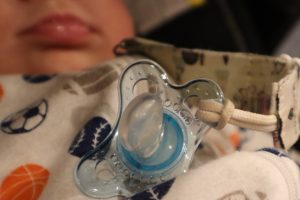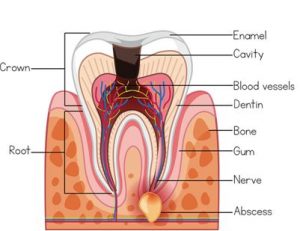Decay’s in very young children and infants is often known as baby bottle decay. This happens when liquids that are sweet cling to an infant’s teeth for a long time. Kids whose pacifiers that are frequently dipped in syrup and sugar during their nap time or night time are harmful because the flow of saliva decreases during their sleep.
Baby bottle decay usually affects the front teeth but other teeth may also be affected. If it is left untreated then it will affect their adult teeth as they come through as well as server pain and infections. If these teeth get infected it can cause the child to have speech problems, crooked or damaged adult teeth.
 While this is all bad news, the good news is that it is quite simple to avoid getting babby bottle decay by applying good oral hygiene at a young age. These are some easy steps in order to prevent baby bottle decay:
While this is all bad news, the good news is that it is quite simple to avoid getting babby bottle decay by applying good oral hygiene at a young age. These are some easy steps in order to prevent baby bottle decay:
- Schedule regular dental visits
- When the first few teeth come in, gently brush without using toothpaste or use fluoride free toothpaste
- Wipe your baby’s gums with a washcloth or clean gauze pad after each feeding
- Clean and massage gum in areas without teeth.
- Avoid filling the bottles with sugary water and soft drinks and juices.
- Never allow you child to fall asleep with a bottle containing anything but water
- Reduce sugar in your child’s diet and never give you child a pacifier dipped with anything sweet.
If you follow these steps your child could have healthy adult teeth. For more information talk to your dentist.
References : WebMd
More
What is an Abscess?
A dental abscess is an upsurge of pus that forms inside the gums or teeth. This is usually caused by an infection. There are two different areas in which the abscess can form. The first one happens at the top of the root which is called a periaphical (Per-e-AP-ih-kul) and the second abscess can occur in the gums at the side of the tooth root which is called a (per-e-o-DON-tul). Either can occur when there is a dental decay, an injury or prior dental work
What do dentists do to treat an Abscess?
Unfortunately an abscess won’t disappear without treatment; even if the abscess were to rupture you will still need treatment. A dentist will treat the area or tooth by getting rid of the infection by draining the pus. In some cases the tooth can be saved by doing a root canal treatment but if the infection is too large it may need to be extracted. Leaving an abscess untreated can lead to serious complications in the future. An abscess can spread to your jaw and other areas of your neck and head if it is left untreated.

Some symptoms of a tooth abscess are:
- Severe, persistent, throbbing toothache that can radiate to the jawbone, neck or ear
- Sensitivity to hot and cold temperatures
- Sensitivity to the pressure of chewing or biting
- Fever
- Swelling in your face or cheek
- Tender, swollen lymph nodes under your jaw or in your neck
- Sudden rush of foul-smelling and foul-tasting, salty fluid in your mouth and pain relief, if the abscess ruptures
- Difficulty breathing or swallowing
What can you do to prevent an abscess?
In order to prevent a tooth abscess, you would need to prevent decay. Taking care of your teeth by
- Brushing your teeth twice a day with fluoride toothpaste
- Visiting your dentist at least twice an year for a clean and check up
- Eat healthy foods and limit the sugar you intake
- Replace your toothbrush regularly (every 4 months or when the bristles are frayed)
- Use dental floss to clean between your teeth
Information from:
Tooth Abscess
Mayo Clinic – Tooth Abscess
More
 While this is all bad news, the good news is that it is quite simple to avoid getting babby bottle decay by applying good oral hygiene at a young age. These are some easy steps in order to prevent baby bottle decay:
While this is all bad news, the good news is that it is quite simple to avoid getting babby bottle decay by applying good oral hygiene at a young age. These are some easy steps in order to prevent baby bottle decay:


